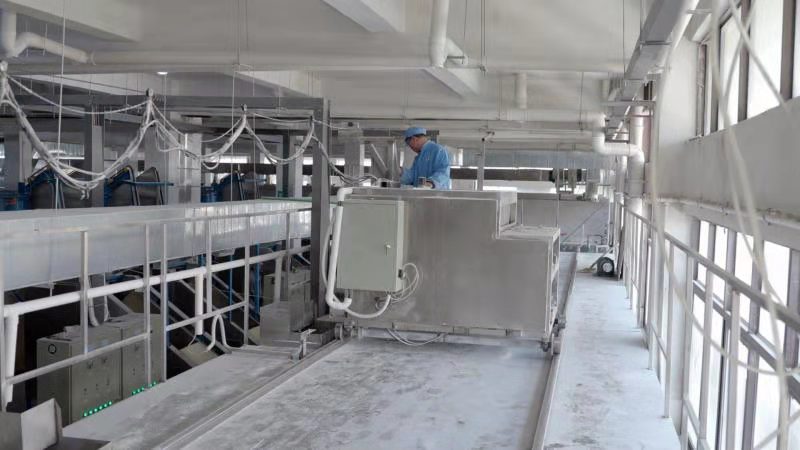As consumer demand for environmentally friendly products continues to grow, vermicelli noodle manufacturers are actively seeking sustainable solutions to improve their production processes. By adopting eco-friendly practices, businesses can reduce waste, conserve resources, and align with modern environmental standards. This guide outlines key strategies for achieving green production in custom vermicelli noodle manufacturing.

Why Sustainability Matters for Vermicelli Noodle Manufacturers
- Environmental Responsibility: Reducing carbon footprints and resource consumption helps minimize environmental harm.
- Consumer Demand: Customers are increasingly choosing brands that prioritize sustainability.
- Regulatory Compliance: Environmental regulations are becoming stricter, pushing manufacturers to adopt greener practices.
- Cost Savings: Energy-efficient processes and waste reduction can significantly cut costs.
Key Strategies for Green Production in Vermicelli Noodle Manufacturing
1. Sustainable Ingredient Sourcing
To ensure a greener production process, vermicelli noodle manufacturers can focus on eco-friendly sourcing practices.
- Organic Ingredients: Use organically grown rice, wheat, or other raw materials to minimize the use of pesticides and fertilizers.
- Local Suppliers: Partnering with local suppliers reduces transportation emissions.
- Certified Farms: Source from farms that follow sustainable agricultural practices.
2. Energy-Efficient Production Equipment
Switching to energy-efficient machinery can drastically reduce electricity consumption and operational costs.
- Energy-Saving Dryers: Advanced drying systems reduce energy use by optimizing heat distribution.
- Low-Energy Steam Systems: Upgraded steamers cut energy costs while maintaining noodle texture.
- Smart Control Systems: Automated equipment with precision temperature control minimizes energy waste.
3. Water Conservation Techniques
Since vermicelli noodle production requires significant water use, implementing conservation strategies is essential.
- Closed-Loop Water Systems: Recycle water used in cooking and steaming.
- Efficient Cleaning Processes: Use high-pressure cleaning systems to minimize water consumption.
- Rainwater Harvesting: Collecting rainwater for non-production tasks reduces overall water use.
4. Eco-Friendly Packaging Solutions
Green packaging minimizes environmental impact and meets modern consumer expectations.
- Biodegradable Materials: Replace plastic packaging with compostable or biodegradable options.
- Minimalist Design: Reduce excess packaging material without compromising product protection.
- Recyclable Materials: Prioritize easily recyclable options such as cardboard or paper-based wraps.
5. Waste Reduction and Recycling
Minimizing production waste plays a crucial role in improving environmental responsibility.
- Food Waste Management: Convert food waste into animal feed or compost.
- Efficient Portioning Systems: Implement precision-cutting machinery to reduce excess product waste.
- Recycling Stations: Install dedicated stations for recycling plastic, metal, and other materials.
6. Renewable Energy Integration
Integrating renewable energy sources into noodle production can drastically reduce carbon emissions.
- Solar Panels: Harness solar energy to power production lines and factory operations.
- Wind Energy: Install wind turbines for sustainable electricity generation.
- Geothermal Systems: Utilize geothermal energy to support heating processes.
7. Employee Training and Green Culture
Developing an environmentally conscious workforce is crucial for maintaining sustainable production.
- Eco-Training Programs: Educate staff on energy efficiency, waste reduction, and sustainable practices.
- Green Culture Encouragement: Incentivize employees who contribute innovative eco-friendly ideas.

Case Study: Successful Green Transformation in a Vermicelli Noodle Manufacturers
One leading vermicelli noodle manufacturers successfully reduced its environmental impact by:
- Switching to solar-powered drying systems, reducing energy costs by 30%, resulting in annual savings of over $50,000.
- Using biodegradable packaging materials, increasing customer satisfaction rates by 20%.
- Implementing a closed-loop water recycling system, saving approximately 100,000 liters of water monthly.
- Upgrading production lines with energy-efficient motors, reducing overall electricity consumption by 25%.
These strategic changes not only enhanced sustainability but also significantly improved production efficiency and cost savings. One leading vermicelli noodle manufacturers successfully reduced its environmental impact by:
- Switching to solar-powered drying systems, reducing energy costs by 30%.
- Using biodegradable packaging materials, increasing customer satisfaction.
- Implementing a closed-loop water recycling system, saving thousands of liters of water monthly.
Conclusion: Embracing Green Innovation for Future Growth
Vermicelli noodle manufacturers who adopt eco-friendly production practices can enhance brand reputation, attract environmentally conscious customers, and improve operational efficiency. By integrating sustainable ingredient sourcing, energy-saving equipment, and eco-friendly packaging, manufacturers can align with global environmental trends and secure long-term success.
Call to Action
Are you seeking a reliable vermicelli noodle manufacturers committed to green practices? Contact our team at LIANGLU for eco-friendly custom noodle solutions designed to meet your business needs.
FAQs About Eco-Friendly Vermicelli Noodle Production
1. How can vermicelli noodle manufacturers reduce energy consumption?
By investing in energy-efficient dryers, steamers, and smart control systems, manufacturers can significantly reduce electricity usage.
2. What packaging materials are best for sustainable vermicelli noodle products?
Biodegradable plastics, paper wraps, and compostable containers are excellent eco-friendly packaging options.
3. How does sustainable ingredient sourcing benefit noodle manufacturers?
Sourcing organic and locally grown ingredients minimizes environmental impact and improves product quality.
4. What role does water recycling play in eco-friendly noodle production?
Water recycling systems help conserve resources by reusing water for cleaning, steaming, and other non-consumable tasks.
5. Why should I choose a green vermicelli noodle manufacturer?
Choosing a sustainable supplier aligns your brand with eco-conscious consumers and ensures compliance with evolving environmental regulations.

